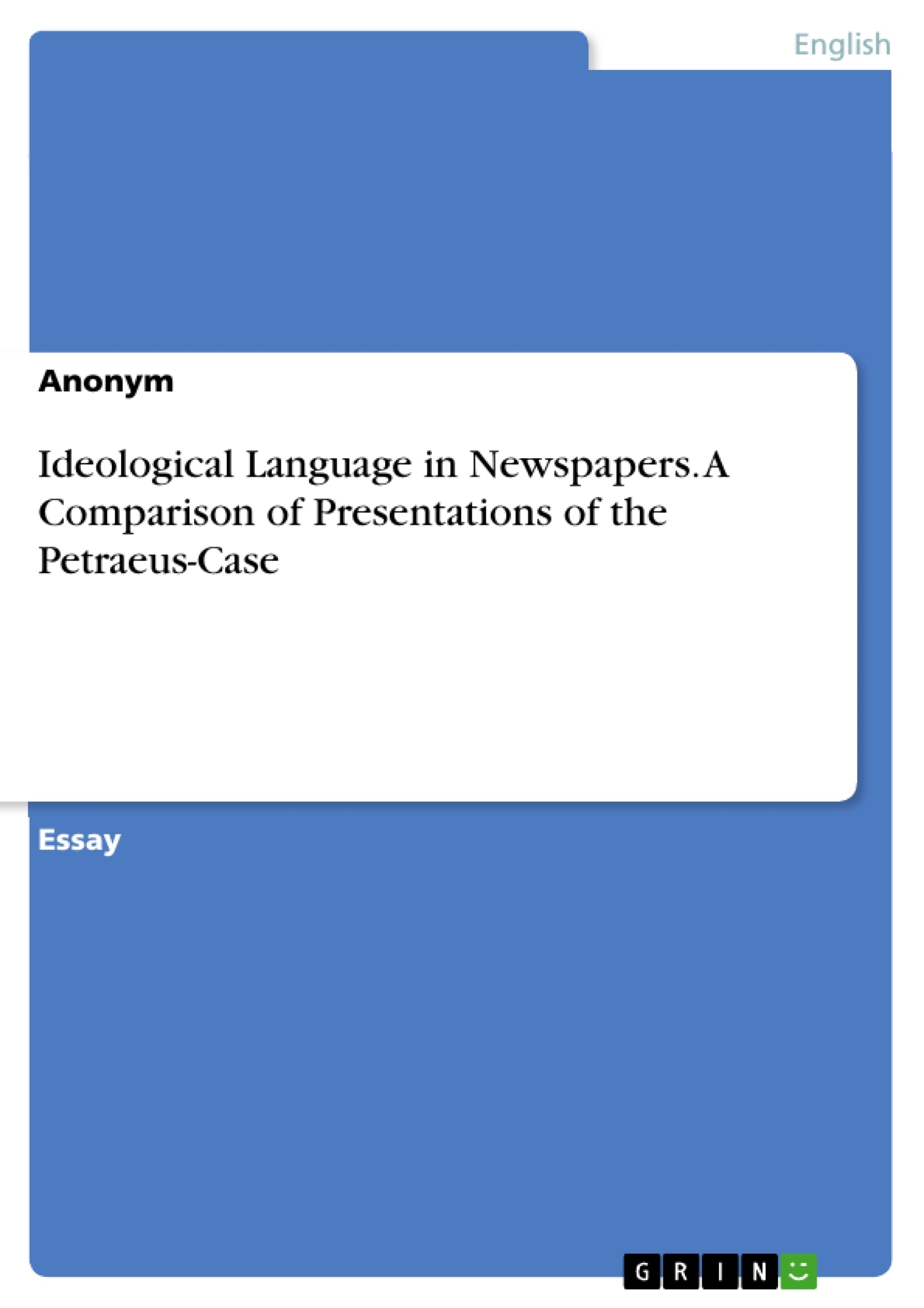Newspaper headings like "David Petraeus: run to ground" and "For Petraeus, echoes of other warrior David" raise the question: Why are there different ways to report on the same event? Both headlines emphasize different aspects by giving more or less importance to particular words. These differences in reporting on the same issue reflect on distinct ideologies various newspapers represent.
How is ideology expressed through language? The French philosopher and social theorist Michel Foucault considers language as 'discourse', which implicates that language is always something mediated, it is a discursive practice. Language which is used to express knowledge and to mediate information is always determined by the ideology of the authority using it. In order to capture the predominance of ideology in newspapers being expressed through language and content aspects, four articles from different newspapers dealing with the resignation of the former CIA Director David Petraeus on November 9, based on an extramarital affair with his biographer, will be compared.
Inhaltsverzeichnis (Table of Contents)
- Ideological Language in Newspapers
- David Petraeus: run to ground
- Left-wing Orientation
- Holder, Mueller face mounting questions on why Petraeus probe kept under wraps
- Right-wing Orientation
- For Petraeus, echoes of other warrior David
- Conservative Orientation
- Love rat war hero quits as boss of CIA
- Populist and Polemic Orientation
Zielsetzung und Themenschwerpunkte (Objectives and Key Themes)
This article explores the way different newspapers report on the same event, specifically focusing on the resignation of former CIA Director David Petraeus due to an extramarital affair. The article compares four different newspaper articles from left-wing, right-wing, conservative, and populist perspectives to understand how ideology influences the language and content of news reporting.
- The impact of ideology on language and content in news reporting
- The use of different linguistic strategies to convey different ideologies
- The role of media in shaping public opinion
- The relationship between language, power, and society
- The differences in reporting between mainstream and tabloid newspapers
Zusammenfassung der Kapitel (Chapter Summaries)
The article examines four articles from different newspapers covering David Petraeus' resignation.
- The first article from The Guardian, a left-wing newspaper, criticizes the National Security Agency for failing to keep the affair a secret and criticizes Petraeus' political actions, particularly his military strategies in Afghanistan. The article focuses on the political aspects of the issue and does not mention the actual affair.
- The second article from FoxNews.com, a right-wing news source, focuses on the secrecy surrounding the Petraeus probe and questions why the affair was kept under wraps. The article suggests that the affair might have impacted Petraeus' decisions and statements about the Libya terror attack, and critiques the lack of notification to the White House.
- The third article from USA Today, a conservative newspaper, compares Petraeus to King David from the Bible, who also committed adultery. The article emphasizes religious and military perspectives, highlighting the moral implications of adultery and the responsibilities of senior officers. It uses strong adjectives and subjective language to convey a conservative ideological perspective.
- The fourth article from The Sun, a British tabloid newspaper, focuses on the sensational aspects of the story, using simple language and emphasizing the superficial details of the affair. The article targets a mass-market audience with a focus on sensationalism and limited political context.
Schlüsselwörter (Keywords)
The main focus of the article is on the analysis of ideological language in newspapers, examining how newspapers from different political stances report on the same event. This includes the use of specific linguistic strategies, like word choice, syntax, and semantic focus, to convey different ideologies. The article also touches upon the impact of media on public opinion and the relationship between language, power, and society.
Frequently Asked Questions
How does ideology influence news reporting?
Ideology influences the choice of words, the focus of the story, and the linguistic strategies used to frame an event, reflecting the political or social stance of the newspaper.
What was the Petraeus case about?
The case involved the resignation of former CIA Director David Petraeus in 2012 following the discovery of an extramarital affair with his biographer.
How did left-wing and right-wing media report differently on the case?
Left-wing media like The Guardian focused on political implications and security failures, while right-wing sources like Fox News questioned the timing and secrecy of the investigation.
What is Foucault's concept of 'discourse' in this context?
Michel Foucault views language as a mediated practice where knowledge and information are always determined by the ideology of the authority using it.
How do tabloid newspapers differ from mainstream media in their reporting?
Tabloids often focus on sensationalism and superficial details (e.g., using terms like "love rat"), whereas mainstream media typically emphasize the political or moral context.
- Quote paper
- Anonym (Author), 2012, Ideological Language in Newspapers. A Comparison of Presentations of the Petraeus-Case, Munich, GRIN Verlag, https://www.grin.com/document/378657



